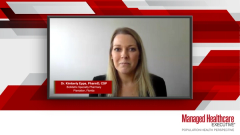Safeguarding Hemostasis and Adherence in Hemophilia A: Specialty Pharmacy Strategies
Specialty pharmacies can help patients with hemophilia A maintain hemostasis and ensure patient safety through medication therapy management, utilizing regional care coordinators and direct pharmacist outreach, and by maintaining consistent provider communication.
Kimberly Epps, PharmD, CSP: It is very important to maintain a patient’s factor levels. I think that MASAC [the Medical and Scientific Advisory Council of the National Hemophilia Foundation] and the World Federation of Hemophilia vary a little bit on the level that should be maintained, and some of the newer products are challenging that to a higher level. But it is very important to maintain that level above at least 1% because you never know what could happen. You never know when there’s going to be a car accident or anything like that. And if you are below that level, the risk to the person is just so great. So you just never know what’s going to happen walking around out there. Within my first year, I had a patient that was noncompliant with their medication. I had just done a compliance and persistence call to talk to him and ask how things were going and if there was anything that was keeping him from infusing on a regular basis because he was very honest about his infusion vacations. I just encouraged him. I was like, “You never know what’s going to happen.” Within a week—he was actually an ambulance driver and they had an accident. He had just infused that morning. And he called me, and was like, “I don’t know what would have happened if I hadn’t been infused. I’m so glad I don’t have to find out.” So you just never know what a day might bring. And with these treatments, patients are able to do things like full-time employment and be out in the community like anyone else. The same accidents that could happen to you, could happen to the hemophilia patient with much greater consequences without those levels well above 1%.
When we notice that a patient is maybe taking too many vacations from their prescribed dose of medication, we do proactively outreach through what we call a regional care coordinator, or the pharmacist themselves, and actually, usually both reach out to the patient and talk to them about any reasons why they’re missing so many doses. We do have an obligation to share that information with the HTC [Hemophilia Treatment Center] or hematologist. That’s part of our job to make sure that the doctor knows that this patient is at risk. So that’s our main outreach and that’s how we handle that. We work directly with the patient and then we communicate that information directly to the HTC. As a specialty pharmacy, we are URAC [Utilization Review Accreditation Commission] and ACHC [Accreditation Commission for Health Care] accredited. So we do assessments on every fill. We assess how many PRNs [as-needed doses] are in the home, if there’s any risk to the patient and any interventions that need to be done like contacting the HTC if we’ve noticed an increase in patient weight out of nowhere or a decrease in patient weight. All of these are weight-based drugs, so we do need to communicate that to the provider because they’re usually seeing them every 6 months to 1 year. We get those touchpoints, and it’s really important that we communicate well with the provider.
Transcript edited for clarity.
Newsletter
Get the latest industry news, event updates, and more from Managed healthcare Executive.

























